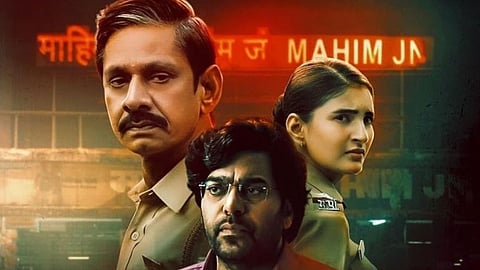Murder in Mahim Series Review: Shines as a social commentary, dims as a thriller
Murder in Mahim(2.5 / 5)
With a title that implies a strong resonance with Mumbai, it is surprising how Murder in Mahim chooses to stay away from the pulsating beat of the metropolis. It resorts to a rather simpler and sophisticated portrayal without going into the underbellies of the city like Anurag Kashyap did with a visceral urgency in Black Friday (2004) or Raman Raghav 2.0 (2016). Neither does it capture the raw originality of a Mumbai police station with the cops battling sweat and creaking fans as they unceremoniously go about interrogating suspects. Rather, the police station here feels like a set that is carefully constructed with no faults and blemishes on its walls; the lighting chooses to balance the image to perfection rather than leaving some necessary shadows and textures.
Director: Raj Acharya
Cast: Vijay Raaz, Ashutosh Rana, Shivani Raghuvanshi, Bharat Ganeshpure, Shivaji Satam, Divya Jagdale, Smita Tambe, Rajesh Khattar, Benafsha Soonawalla
Director Raj Acharya is not concerned with shining light on the rich character of the city. The only signs of its presence are felt through montages in the opening frames of the first episode, some mumbaiya slang words like ‘mangtay’, ‘apun’ that slide into the dialogues and pivotal moments that are conventionally shot at the Taj Hotel or Dadar Chowpatty. It largely leaves room for more to be uncovered as the series pitfalls into the visual landscape of television shows like C.I.D (1998-2018) and Crime Patrol (2003-) at times, making it feel stagnant and unrewarding.
However, Murder in Mahim has a lot going on that catches you off-guard. Adapted from a book of the same name by Jerry Pinto, it tells the story of Inspector Jende (Vijay Raaz) and ex-journalist Peter Fernandes (Ashutosh Rana) as they settle their past disputes and try to solve a series of murders that take place at Mahim railway station. The year is 2013 and Article 377, which criminalized homosexuality, is still in practice. Set against this backdrop, it revolves around characters who are caught in the middle of this law that defines them as criminals for choosing to love someone. Starting on a slow note, the show picks up the pace from the third episode, leading to some heartwarming scenes.
The narrative is focused on building father-son relationships across characters. Jende shares a rather complex relationship with his father, Dhular (Shivaji Satam) who was a cop before he got suspended for taking a bribe. Now, staying with Jende, his wife and son, Dhular faces timely blows from his short-tempered son. Meanwhile, Jende’s own son is afraid of his anger issues and maintains his distance from him. This is held in contrast to his corrupt junior cop, Pravin Durra (Bharat Ganeshpure). Jende hates Durra for his nefarious activities but Durra is a good father who is shown patiently explaining to his son after he is caught reading adult magazines. Further, Peter shares a distant relationship with his son who is a ‘gay rights activist’, something that comes as a shock to him. It is in the unhurried unfolding of these sequences that Murder in Mahim manages to hold its ground through empathetic writing. It is filled with striking conversations on the experience of being gay in India through scenes that border on being preachy at times, but nevertheless manage to create ripples of thought and emotion.
Particularly, the blooming love between ASI Firdaus Rabbani (Shivani Raghuvanshi) and Rehana (Benafsha Soonawala), adds up a layer of intrigue with the dynamics of a woman cop and her inability to take her love to completion. She is a victim of the same law she has to uphold. The backstories of the characters end up becoming more compelling than the murder mystery elements, which play rather sheepishly, failing to generate the necessary tension and thrill. The twists are not as smartly executed and just convolute the narrative further. It is a clever device to set up a thriller in the context of Article 377 and the various stories of gay people, however, the intersection points are not firmly linked together, making it feel like separate parts of the whole.
The same is true for the performances, featuring the good, the bad and everything in between. Vijay Raaz is refreshing to witness as a cop who wears his anger on his face. His silent demeanour supports the character well and so does his natural irritation and smugness. However, his role is not as smartly written especially during the investigation scenes. We don’t get a sense of his sharp intellect even though it is hinted at through dialogue. There is a lack of flavour to his character which prevents it from being memorable. This is something which even makes Ashutosh Rana seem amateur. His performance leaves room for ambiguity as he does the bare minimum and manages to stay believable. Shivani Raghuvanshi is sincere and holds up the series with her naive and vulnerable portrayal. In the middle of such seasoned names, it is Marathi actor Bharat Ganeshpure who leaves a shocking note through his performance and skilfully elevates his scenes.
It is in some of these scattered moments that Murder in Mahim reaches a crescendo, only to fizzle out in the next one. It is full of inconsistencies in the plot which prevents it from reaching its true potential. The makers seem to be confused on what to make of it. Is it a Bombay noir crime thriller? an exploration of father-son relationships? a coming-of-age narrative? or a destigmatisation of homosexuality? It could have beautifully become a seamless blend of all with a plot that was constructed better. As for now, it strictly remains the jack of all trades and master of only one: social commentary.

